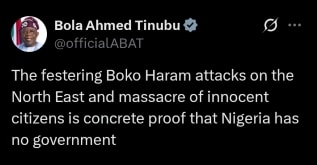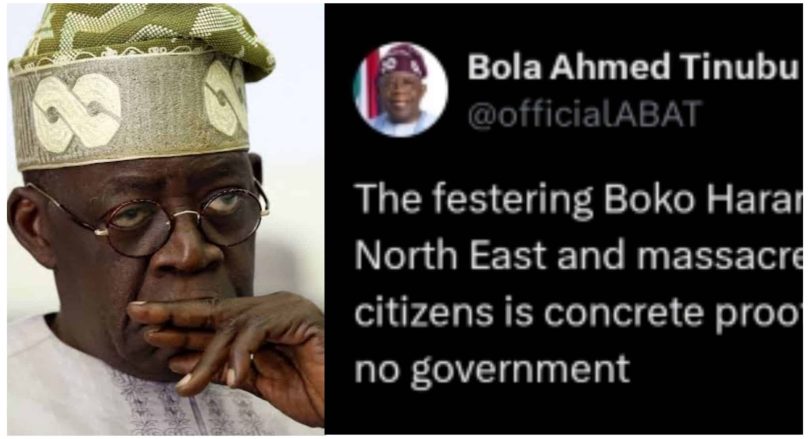A 2014 social media post by President Bola Ahmed Tinubu has resurfaced online, triggering widespread reactions as Nigerians revisit his past criticism of insecurity under the former administration.
In the old message, Tinubu condemned Boko Haram attacks and the “massacre of innocent citizens,” describing the situation then as “concrete proof that Nigeria has no government.”
..., which resurfaced on Monday, spread quickly as many users compared Tinubu’s earlier remarks to the present state of insecurity and rising economic pressure across the country.

Nigerians Draw Parallels With Current Challenges
Social media users reacted strongly to the flashback. One user wrote, “Now the tables have turned.”
Another expressed surprise at the low attention the old post received, stating, “Only 136 bookmarks? If this was a tweet by PO, it would have attracted 100M bookmarks.”
Some demanded immediate action. “Now, act!!!” one user said, while another dismissed the uproar with the word, “Rest.”
A different commenter openly questioned the government’s performance, asking, “Oga drug lord, does Nigeria have concrete evidence of governance now? Oga wake up, terrorists and kidnappers are in Abuja. Has Nigeria failed as a state?”
Citizens Voice Frustration Over Worsening Insecurity
The strong reactions reflect growing public frustration. Many argue that killings, abductions, inflation, and widespread hardship have intensified under Tinubu’s administration despite his earlier criticism of past governments for similar failures.
Security experts also describe the situation as severe. Independent trackers such as ACLED and Global Rights report thousands of killings and kidnappings since Tinubu assumed office.
Kidnapping for ransom remains common, while communities across the North-West and North-Central continue to face repeated attacks.
Presidency Highlights Gains, Critics Disagree
The presidency maintains that the neutralisation of several Boko Haram and bandit commanders proves progress in the fight against insecurity.
Critics, however, insist that the frequency and brutality of violent incidents suggest that Nigeria’s security challenges have not improved and may have grown worse.

